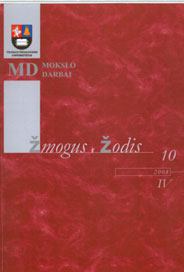Edmundo Husserlio transcendentalinė fenomenologija: negatyviojo mąstymo įveikimas
Edmund Husserl’s Transcendental Phenomenology: Overcoming the Negative Thinking
Author(s): Auridas GajauskasSubject(s): Philosophy
Published by: Vytauto Didžiojo Universitetas
Keywords: Husserl; phenomenology; Cartesian doubt; transcendental field.
Summary/Abstract: The purpose of the article is phenomenological criticism of the modern thinking. The problems are presented in three analyses. The first one presents criticism of Cartesian doubt. Here we find out that the Descartes’ universal doubt in fact is universal negation, with the purpose to establish metaphysical instance of cogitatio. The other two chapters analyse authorities of existentialism as developed within boundaries of modern natural science and fundamental ontology. The three criticisms aim to show that instances of truth of Descartes, the natural science and existentialism share their authority with other structures of knowledge. In chapter four, the Husserl’s perceptual phenomenology is defined both as methodology and as post-structuralist philosophy. In the latter case, consciousness is defined through perception of transcendental field of possibilities (‘the eternal Heraclitian river of phenomena’), which incites positioning the perceptual phenomenology beyond the principles of the modern episteme and parallelising it for alternative knowledges transcending the modern structuralism.
Journal: Žmogus ir žodis
- Issue Year: 10/2008
- Issue No: 4
- Page Range: 39-48
- Page Count: 10
- Language: Lithuanian

